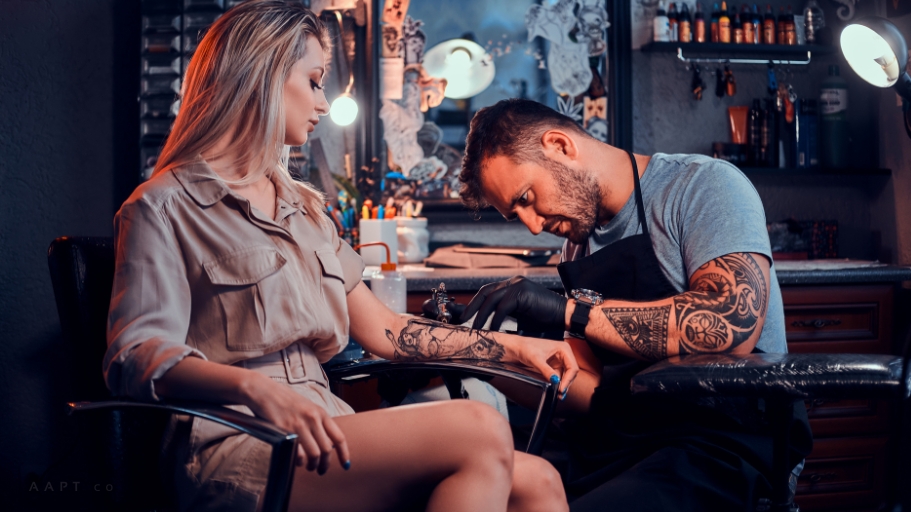So, tattoos have become increasingly popular as a form of self-expression and body art. Yet, a very interesting and lesser-known fact about tattoo is this form of body art is a traditional form of art that prevailed hundred years ago. Due to its traditional and potentially spiritual nature, tattooing very distinctly got qualified as a folk art. However, due to the skill and artistry of certain tattooists such as Coco, tattooing also is among the fine arts. However, before taking the plunge and getting inked, it’s crucial to consider various factors to ensure a positive and fulfilling tattoo experience. From design selection to aftercare, we are going to helps you with essential insights and guidelines, especially certain things to keep in mind before getting yourself a tattoo. As you know getting a tattoo is a big decision for anyone and especially for one’s body. Yet, it’s one decision that will stay with you for years and years and may be forever.
If you are planning to get inked and don’t want to regret it later, then here are ten things you need to consider before getting a tattoo. Keep reading.
1. Research Tattoo Artists and Studios
Choosing the right tattoo artist and studio is paramount to a successful tattoo experience. Conduct thorough research, read reviews, and examine portfolios to find an artist whose style aligns with your vision. Ensure that the studio maintains high standards of hygiene and follows proper sterilization practices to minimize the risk of infections.
2. Think Carefully About the Design
A tattoo is a permanent mark on your body, so it’s vital to select a design that holds personal significance and resonates with you. Take your time to explore different design options, consider their symbolism, and envision how they will look on your skin. Consult with the tattoo artist to customize the design and make it truly unique.
3. Consider Placement
Placement of your tattoo is as important as the design itself. Think about the visibility of the tattoo and how it may impact your personal and professional life. Some employers or social situations may have specific policies or expectations regarding visible tattoos. Choose a placement that aligns with your lifestyle and future considerations.
4. Understand the Pain and Healing Process
Tattoos involve a level of discomfort, and the pain experienced can vary depending on the location and individual pain tolerance which is one of the crucial things to keep in mind before getting a tattoo. Research and understand the typical pain associated with the chosen placement. Additionally, be prepared for the healing process, which may include redness, swelling, and scabbing. Follow the aftercare instructions provided by your tattoo artist diligently to ensure proper healing and minimize complications.

5. Consider Allergies and Skin Sensitivities
Before getting a tattoo, it’s essential to consider any known allergies or skin sensitivities you may have. Consult with your tattoo artist and inform them about any specific concerns you may have. They can guide you on the types of inks and aftercare products that are suitable for your skin to prevent allergic reactions or other adverse effects.
6. Think Long-Term: Aging and Lifestyle Changes
While tattoos are meant to be permanent, it’s important to consider how they may evolve with time. Skin naturally ages and undergoes changes, which can affect the appearance of a tattoo over the years. Additionally, think about how the design may be impacted by lifestyle changes such as weight fluctuations or future career choices. Opt for a design that can adapt and still hold significance even as circumstances change.
7. Evaluate Emotional and Mental Readiness
Getting a tattoo is a significant decision that can have emotional and mental implications. Ensure that you are emotionally prepared for the commitment and the potential impact it may have on your self-image. Take the time to reflect on the motivations behind getting a tattoo and ensure that it aligns with your values and personal growth.
8. Budget for Quality Work
Tattoos are an investment, and it’s essential to budget accordingly for quality work. Skilled tattoo artists may charge higher prices, but it’s worth investing in their expertise and professionalism. Avoid compromising on the quality of your tattoo for the sake of saving money, as it can lead to unsatisfactory results or potential health risks which is another important.
9. Consider Cultural and Social Implications
Certain symbols or designs may carry cultural or religious significance. It’s crucial to respect and understand the cultural implications associated with specific tattoo choices, especially if you do not belong to that culture. Additionally, be aware of the social perceptions and potential prejudices that may exist around tattoos in certain communities or professional environments.
10. Embrace Open Communication with the Tattoo Artist
Maintaining open and clear communication with your tattoo artist is vital throughout the entire process. Discuss your expectations, concerns, and any specific requirements you may have. A good artist will listen to your input, provide professional advice, and ensure that you feel comfortable and informed every step of the way.
Getting a tattoo can be a transformative and empowering experience, but it requires careful consideration and preparation. By researching tattoo artists, selecting meaningful designs, understanding the pain and healing process, considering long-term implications, and embracing open communication, you can make informed decisions that result in a beautiful and meaningful tattoo that you’ll cherish for a lifetime. Remember, taking the time to plan and prepare will enhance your overall tattoo experience and increase your satisfaction with the end result.
